A Report on the Socio-Economic & Environmental Impacts of Hosting
VerifiedAdded on 2023/06/18
|9
|2595
|368
Report
AI Summary
This report examines the multifaceted impacts of hosting the World Cup, focusing on economic, environmental, and tourism perspectives. It highlights the economic benefits such as job creation and revenue generation, while also addressing challenges like increased inflation and the burden on taxpayers. The analysis extends to environmental concerns, including carbon footprint and pollution, alongside regeneration opportunities. Furthermore, the report explores the short-term and long-term effects on the tourism, hospitality, and events industries, emphasizing logistical challenges and the potential for increased popularity and revenue. The conclusion summarizes the responsibilities and opportunities that come with hosting such a large-scale event, and the recommendations suggest strategies for maximizing benefits and minimizing challenges related to economic stability, environmental sustainability, and tourism development.
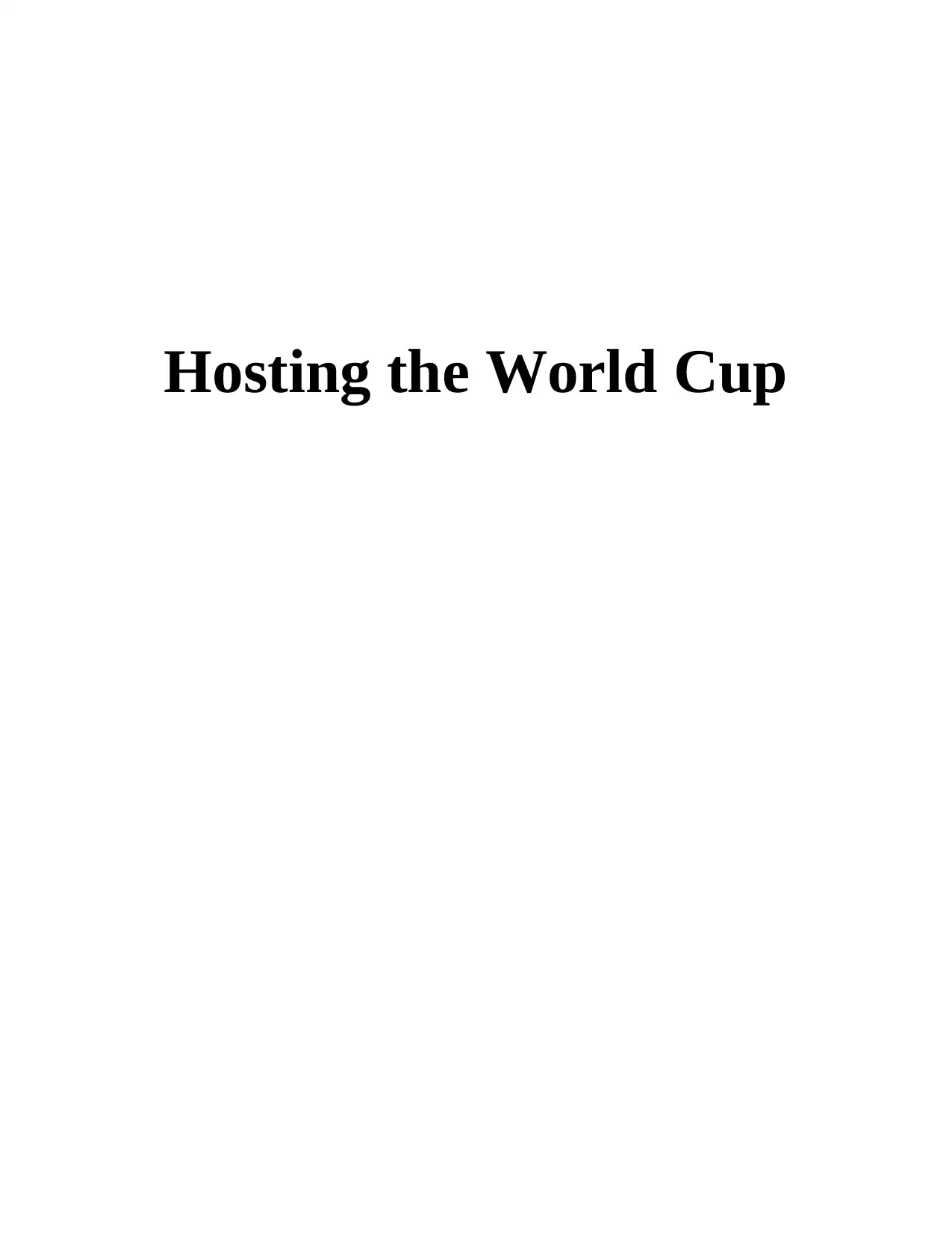
Hosting the World Cup
Paraphrase This Document
Need a fresh take? Get an instant paraphrase of this document with our AI Paraphraser
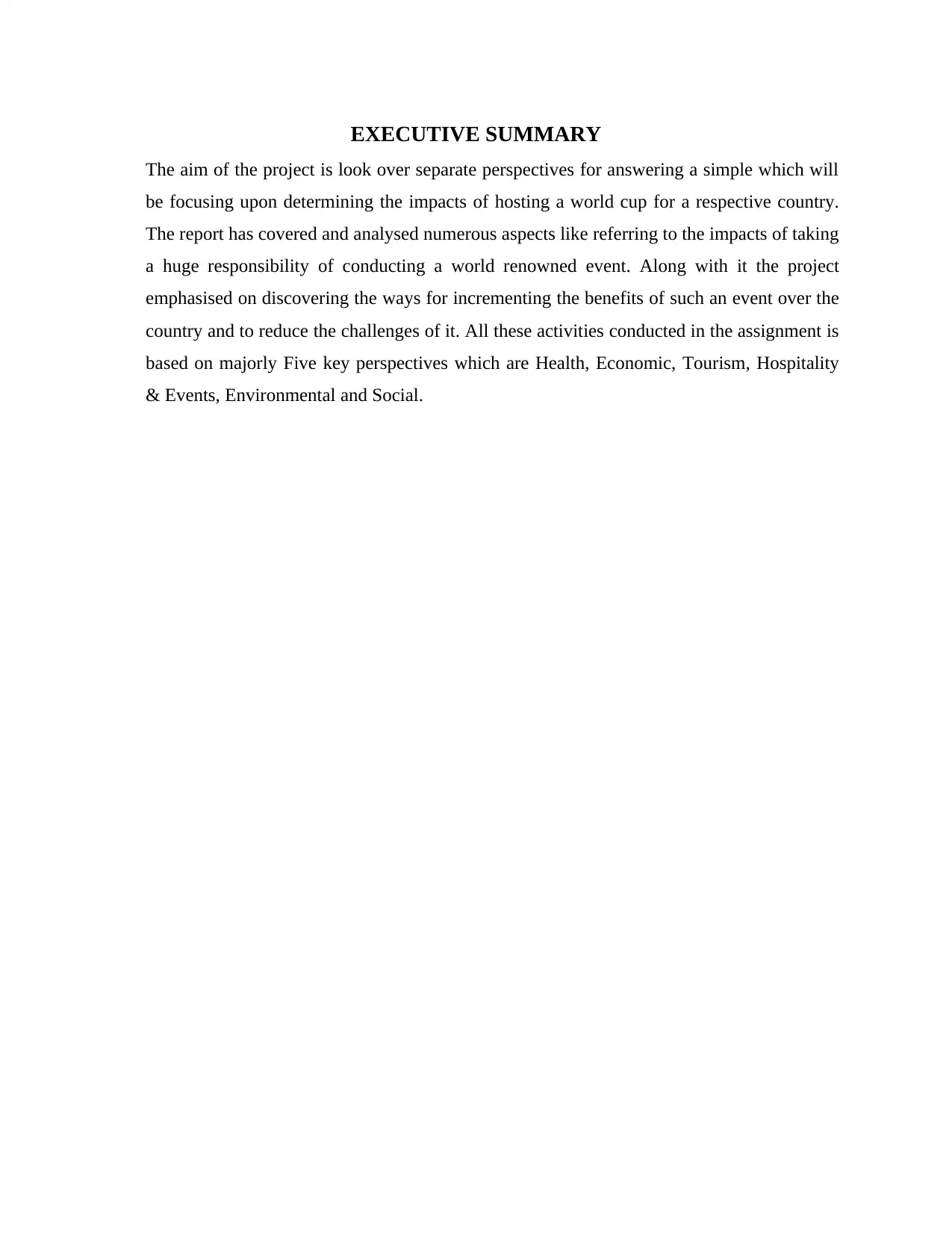
EXECUTIVE SUMMARY
The aim of the project is look over separate perspectives for answering a simple which will
be focusing upon determining the impacts of hosting a world cup for a respective country.
The report has covered and analysed numerous aspects like referring to the impacts of taking
a huge responsibility of conducting a world renowned event. Along with it the project
emphasised on discovering the ways for incrementing the benefits of such an event over the
country and to reduce the challenges of it. All these activities conducted in the assignment is
based on majorly Five key perspectives which are Health, Economic, Tourism, Hospitality
& Events, Environmental and Social.
The aim of the project is look over separate perspectives for answering a simple which will
be focusing upon determining the impacts of hosting a world cup for a respective country.
The report has covered and analysed numerous aspects like referring to the impacts of taking
a huge responsibility of conducting a world renowned event. Along with it the project
emphasised on discovering the ways for incrementing the benefits of such an event over the
country and to reduce the challenges of it. All these activities conducted in the assignment is
based on majorly Five key perspectives which are Health, Economic, Tourism, Hospitality
& Events, Environmental and Social.
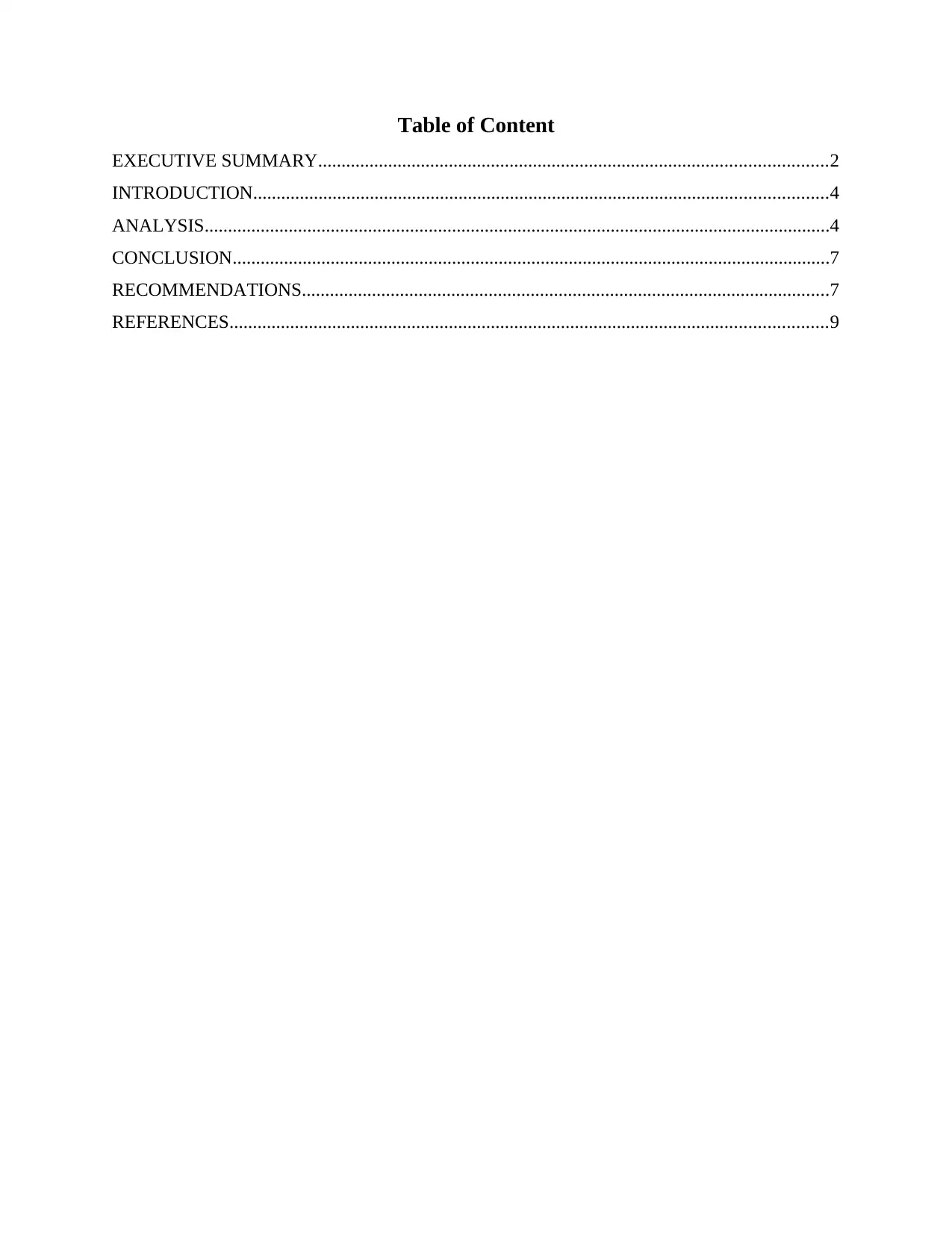
Table of Content
EXECUTIVE SUMMARY.............................................................................................................2
INTRODUCTION...........................................................................................................................4
ANALYSIS......................................................................................................................................4
CONCLUSION................................................................................................................................7
RECOMMENDATIONS.................................................................................................................7
REFERENCES................................................................................................................................9
EXECUTIVE SUMMARY.............................................................................................................2
INTRODUCTION...........................................................................................................................4
ANALYSIS......................................................................................................................................4
CONCLUSION................................................................................................................................7
RECOMMENDATIONS.................................................................................................................7
REFERENCES................................................................................................................................9
⊘ This is a preview!⊘
Do you want full access?
Subscribe today to unlock all pages.

Trusted by 1+ million students worldwide
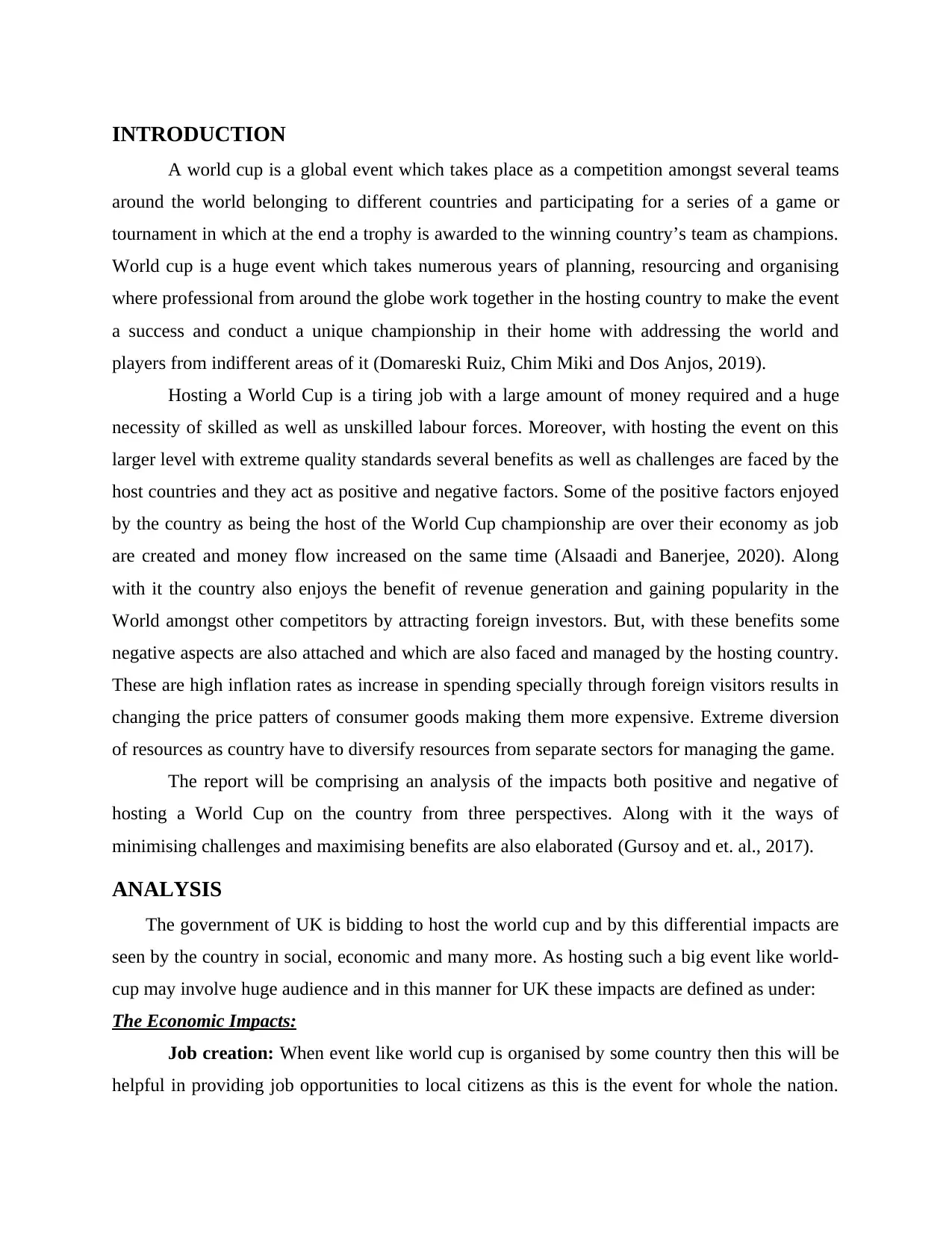
INTRODUCTION
A world cup is a global event which takes place as a competition amongst several teams
around the world belonging to different countries and participating for a series of a game or
tournament in which at the end a trophy is awarded to the winning country’s team as champions.
World cup is a huge event which takes numerous years of planning, resourcing and organising
where professional from around the globe work together in the hosting country to make the event
a success and conduct a unique championship in their home with addressing the world and
players from indifferent areas of it (Domareski Ruiz, Chim Miki and Dos Anjos, 2019).
Hosting a World Cup is a tiring job with a large amount of money required and a huge
necessity of skilled as well as unskilled labour forces. Moreover, with hosting the event on this
larger level with extreme quality standards several benefits as well as challenges are faced by the
host countries and they act as positive and negative factors. Some of the positive factors enjoyed
by the country as being the host of the World Cup championship are over their economy as job
are created and money flow increased on the same time (Alsaadi and Banerjee, 2020). Along
with it the country also enjoys the benefit of revenue generation and gaining popularity in the
World amongst other competitors by attracting foreign investors. But, with these benefits some
negative aspects are also attached and which are also faced and managed by the hosting country.
These are high inflation rates as increase in spending specially through foreign visitors results in
changing the price patters of consumer goods making them more expensive. Extreme diversion
of resources as country have to diversify resources from separate sectors for managing the game.
The report will be comprising an analysis of the impacts both positive and negative of
hosting a World Cup on the country from three perspectives. Along with it the ways of
minimising challenges and maximising benefits are also elaborated (Gursoy and et. al., 2017).
ANALYSIS
The government of UK is bidding to host the world cup and by this differential impacts are
seen by the country in social, economic and many more. As hosting such a big event like world-
cup may involve huge audience and in this manner for UK these impacts are defined as under:
The Economic Impacts:
Job creation: When event like world cup is organised by some country then this will be
helpful in providing job opportunities to local citizens as this is the event for whole the nation.
A world cup is a global event which takes place as a competition amongst several teams
around the world belonging to different countries and participating for a series of a game or
tournament in which at the end a trophy is awarded to the winning country’s team as champions.
World cup is a huge event which takes numerous years of planning, resourcing and organising
where professional from around the globe work together in the hosting country to make the event
a success and conduct a unique championship in their home with addressing the world and
players from indifferent areas of it (Domareski Ruiz, Chim Miki and Dos Anjos, 2019).
Hosting a World Cup is a tiring job with a large amount of money required and a huge
necessity of skilled as well as unskilled labour forces. Moreover, with hosting the event on this
larger level with extreme quality standards several benefits as well as challenges are faced by the
host countries and they act as positive and negative factors. Some of the positive factors enjoyed
by the country as being the host of the World Cup championship are over their economy as job
are created and money flow increased on the same time (Alsaadi and Banerjee, 2020). Along
with it the country also enjoys the benefit of revenue generation and gaining popularity in the
World amongst other competitors by attracting foreign investors. But, with these benefits some
negative aspects are also attached and which are also faced and managed by the hosting country.
These are high inflation rates as increase in spending specially through foreign visitors results in
changing the price patters of consumer goods making them more expensive. Extreme diversion
of resources as country have to diversify resources from separate sectors for managing the game.
The report will be comprising an analysis of the impacts both positive and negative of
hosting a World Cup on the country from three perspectives. Along with it the ways of
minimising challenges and maximising benefits are also elaborated (Gursoy and et. al., 2017).
ANALYSIS
The government of UK is bidding to host the world cup and by this differential impacts are
seen by the country in social, economic and many more. As hosting such a big event like world-
cup may involve huge audience and in this manner for UK these impacts are defined as under:
The Economic Impacts:
Job creation: When event like world cup is organised by some country then this will be
helpful in providing job opportunities to local citizens as this is the event for whole the nation.
Paraphrase This Document
Need a fresh take? Get an instant paraphrase of this document with our AI Paraphraser
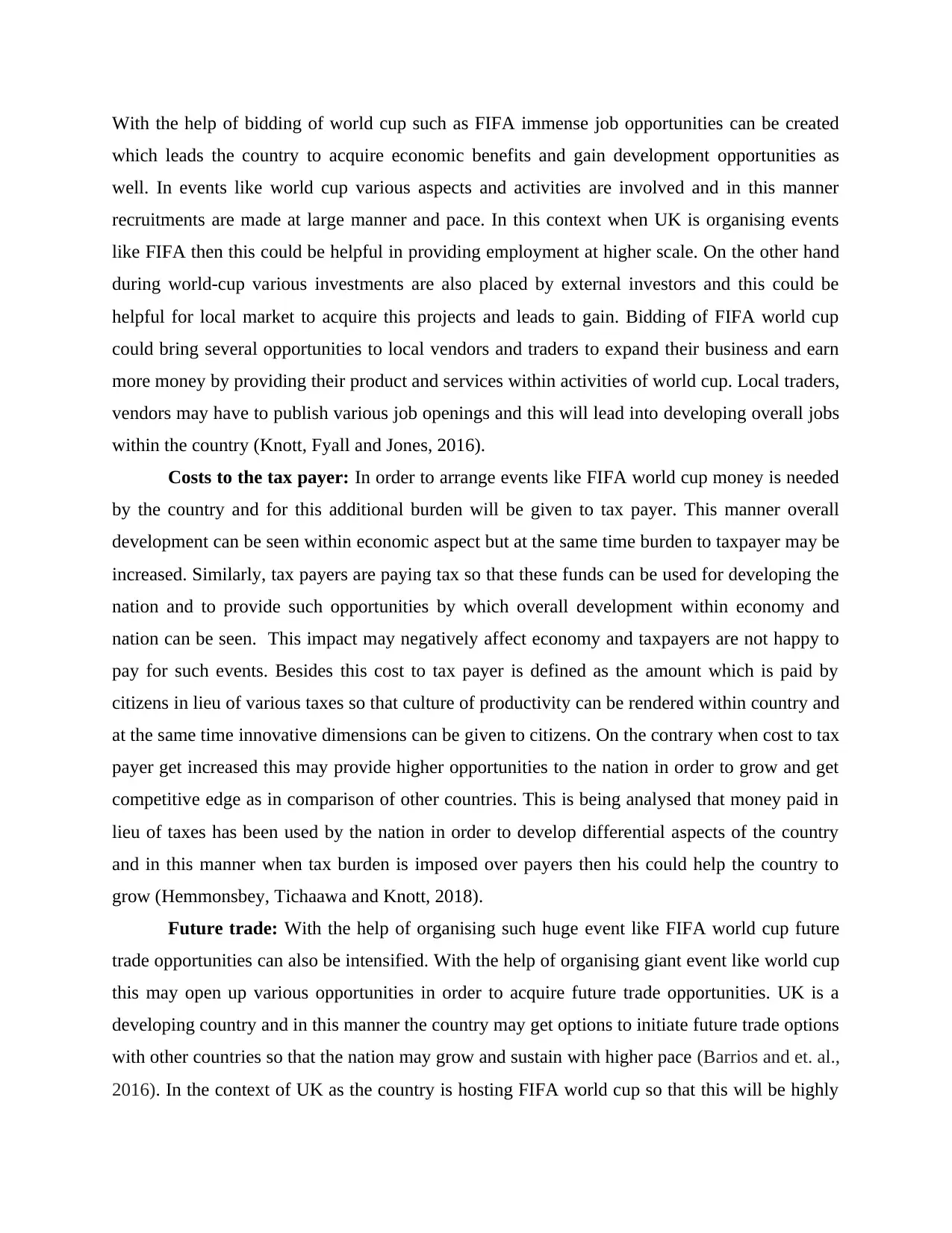
With the help of bidding of world cup such as FIFA immense job opportunities can be created
which leads the country to acquire economic benefits and gain development opportunities as
well. In events like world cup various aspects and activities are involved and in this manner
recruitments are made at large manner and pace. In this context when UK is organising events
like FIFA then this could be helpful in providing employment at higher scale. On the other hand
during world-cup various investments are also placed by external investors and this could be
helpful for local market to acquire this projects and leads to gain. Bidding of FIFA world cup
could bring several opportunities to local vendors and traders to expand their business and earn
more money by providing their product and services within activities of world cup. Local traders,
vendors may have to publish various job openings and this will lead into developing overall jobs
within the country (Knott, Fyall and Jones, 2016).
Costs to the tax payer: In order to arrange events like FIFA world cup money is needed
by the country and for this additional burden will be given to tax payer. This manner overall
development can be seen within economic aspect but at the same time burden to taxpayer may be
increased. Similarly, tax payers are paying tax so that these funds can be used for developing the
nation and to provide such opportunities by which overall development within economy and
nation can be seen. This impact may negatively affect economy and taxpayers are not happy to
pay for such events. Besides this cost to tax payer is defined as the amount which is paid by
citizens in lieu of various taxes so that culture of productivity can be rendered within country and
at the same time innovative dimensions can be given to citizens. On the contrary when cost to tax
payer get increased this may provide higher opportunities to the nation in order to grow and get
competitive edge as in comparison of other countries. This is being analysed that money paid in
lieu of taxes has been used by the nation in order to develop differential aspects of the country
and in this manner when tax burden is imposed over payers then his could help the country to
grow (Hemmonsbey, Tichaawa and Knott, 2018).
Future trade: With the help of organising such huge event like FIFA world cup future
trade opportunities can also be intensified. With the help of organising giant event like world cup
this may open up various opportunities in order to acquire future trade opportunities. UK is a
developing country and in this manner the country may get options to initiate future trade options
with other countries so that the nation may grow and sustain with higher pace (Barrios and et. al.,
2016). In the context of UK as the country is hosting FIFA world cup so that this will be highly
which leads the country to acquire economic benefits and gain development opportunities as
well. In events like world cup various aspects and activities are involved and in this manner
recruitments are made at large manner and pace. In this context when UK is organising events
like FIFA then this could be helpful in providing employment at higher scale. On the other hand
during world-cup various investments are also placed by external investors and this could be
helpful for local market to acquire this projects and leads to gain. Bidding of FIFA world cup
could bring several opportunities to local vendors and traders to expand their business and earn
more money by providing their product and services within activities of world cup. Local traders,
vendors may have to publish various job openings and this will lead into developing overall jobs
within the country (Knott, Fyall and Jones, 2016).
Costs to the tax payer: In order to arrange events like FIFA world cup money is needed
by the country and for this additional burden will be given to tax payer. This manner overall
development can be seen within economic aspect but at the same time burden to taxpayer may be
increased. Similarly, tax payers are paying tax so that these funds can be used for developing the
nation and to provide such opportunities by which overall development within economy and
nation can be seen. This impact may negatively affect economy and taxpayers are not happy to
pay for such events. Besides this cost to tax payer is defined as the amount which is paid by
citizens in lieu of various taxes so that culture of productivity can be rendered within country and
at the same time innovative dimensions can be given to citizens. On the contrary when cost to tax
payer get increased this may provide higher opportunities to the nation in order to grow and get
competitive edge as in comparison of other countries. This is being analysed that money paid in
lieu of taxes has been used by the nation in order to develop differential aspects of the country
and in this manner when tax burden is imposed over payers then his could help the country to
grow (Hemmonsbey, Tichaawa and Knott, 2018).
Future trade: With the help of organising such huge event like FIFA world cup future
trade opportunities can also be intensified. With the help of organising giant event like world cup
this may open up various opportunities in order to acquire future trade opportunities. UK is a
developing country and in this manner the country may get options to initiate future trade options
with other countries so that the nation may grow and sustain with higher pace (Barrios and et. al.,
2016). In the context of UK as the country is hosting FIFA world cup so that this will be highly
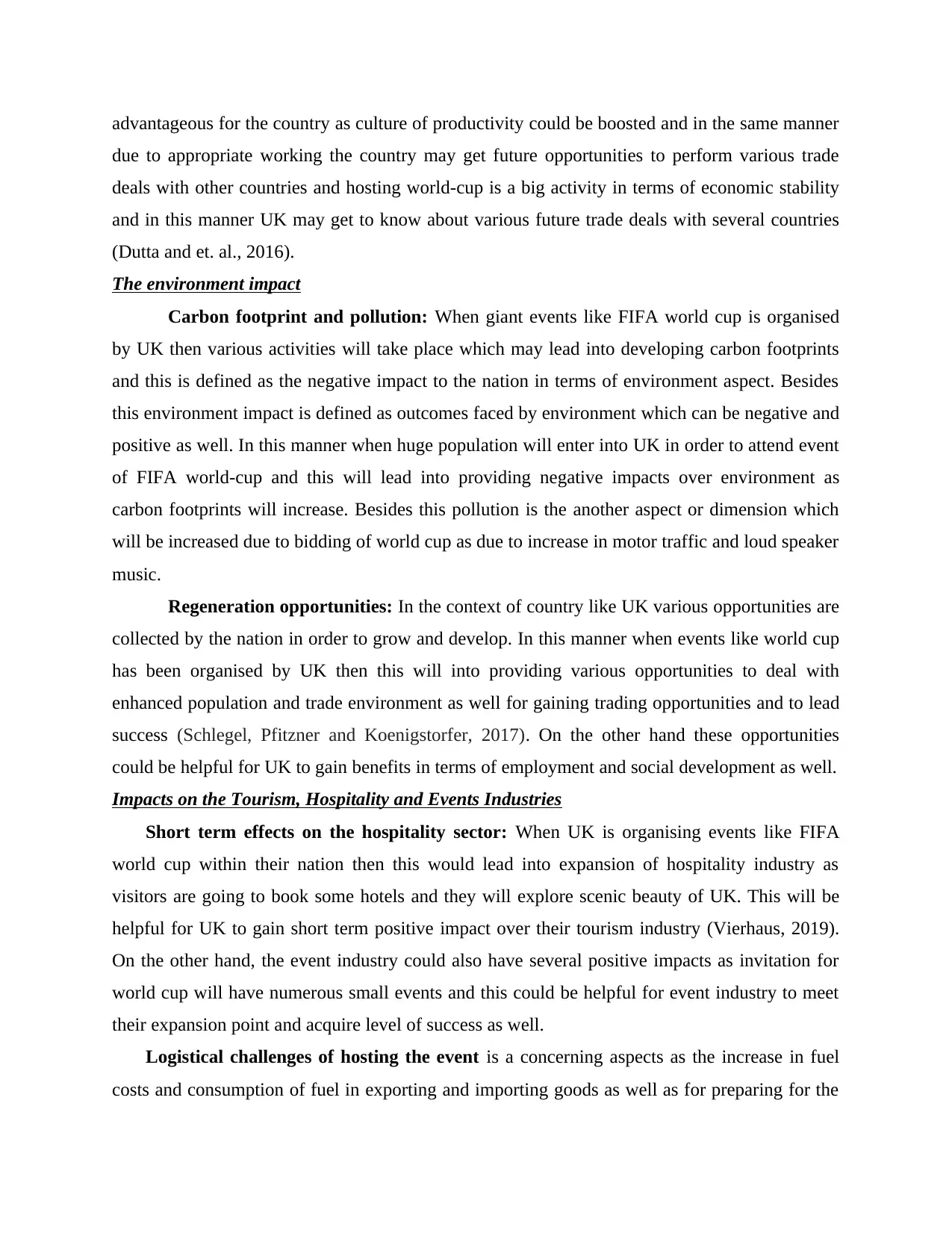
advantageous for the country as culture of productivity could be boosted and in the same manner
due to appropriate working the country may get future opportunities to perform various trade
deals with other countries and hosting world-cup is a big activity in terms of economic stability
and in this manner UK may get to know about various future trade deals with several countries
(Dutta and et. al., 2016).
The environment impact
Carbon footprint and pollution: When giant events like FIFA world cup is organised
by UK then various activities will take place which may lead into developing carbon footprints
and this is defined as the negative impact to the nation in terms of environment aspect. Besides
this environment impact is defined as outcomes faced by environment which can be negative and
positive as well. In this manner when huge population will enter into UK in order to attend event
of FIFA world-cup and this will lead into providing negative impacts over environment as
carbon footprints will increase. Besides this pollution is the another aspect or dimension which
will be increased due to bidding of world cup as due to increase in motor traffic and loud speaker
music.
Regeneration opportunities: In the context of country like UK various opportunities are
collected by the nation in order to grow and develop. In this manner when events like world cup
has been organised by UK then this will into providing various opportunities to deal with
enhanced population and trade environment as well for gaining trading opportunities and to lead
success (Schlegel, Pfitzner and Koenigstorfer, 2017). On the other hand these opportunities
could be helpful for UK to gain benefits in terms of employment and social development as well.
Impacts on the Tourism, Hospitality and Events Industries
Short term effects on the hospitality sector: When UK is organising events like FIFA
world cup within their nation then this would lead into expansion of hospitality industry as
visitors are going to book some hotels and they will explore scenic beauty of UK. This will be
helpful for UK to gain short term positive impact over their tourism industry (Vierhaus, 2019).
On the other hand, the event industry could also have several positive impacts as invitation for
world cup will have numerous small events and this could be helpful for event industry to meet
their expansion point and acquire level of success as well.
Logistical challenges of hosting the event is a concerning aspects as the increase in fuel
costs and consumption of fuel in exporting and importing goods as well as for preparing for the
due to appropriate working the country may get future opportunities to perform various trade
deals with other countries and hosting world-cup is a big activity in terms of economic stability
and in this manner UK may get to know about various future trade deals with several countries
(Dutta and et. al., 2016).
The environment impact
Carbon footprint and pollution: When giant events like FIFA world cup is organised
by UK then various activities will take place which may lead into developing carbon footprints
and this is defined as the negative impact to the nation in terms of environment aspect. Besides
this environment impact is defined as outcomes faced by environment which can be negative and
positive as well. In this manner when huge population will enter into UK in order to attend event
of FIFA world-cup and this will lead into providing negative impacts over environment as
carbon footprints will increase. Besides this pollution is the another aspect or dimension which
will be increased due to bidding of world cup as due to increase in motor traffic and loud speaker
music.
Regeneration opportunities: In the context of country like UK various opportunities are
collected by the nation in order to grow and develop. In this manner when events like world cup
has been organised by UK then this will into providing various opportunities to deal with
enhanced population and trade environment as well for gaining trading opportunities and to lead
success (Schlegel, Pfitzner and Koenigstorfer, 2017). On the other hand these opportunities
could be helpful for UK to gain benefits in terms of employment and social development as well.
Impacts on the Tourism, Hospitality and Events Industries
Short term effects on the hospitality sector: When UK is organising events like FIFA
world cup within their nation then this would lead into expansion of hospitality industry as
visitors are going to book some hotels and they will explore scenic beauty of UK. This will be
helpful for UK to gain short term positive impact over their tourism industry (Vierhaus, 2019).
On the other hand, the event industry could also have several positive impacts as invitation for
world cup will have numerous small events and this could be helpful for event industry to meet
their expansion point and acquire level of success as well.
Logistical challenges of hosting the event is a concerning aspects as the increase in fuel
costs and consumption of fuel in exporting and importing goods as well as for preparing for the
⊘ This is a preview!⊘
Do you want full access?
Subscribe today to unlock all pages.

Trusted by 1+ million students worldwide
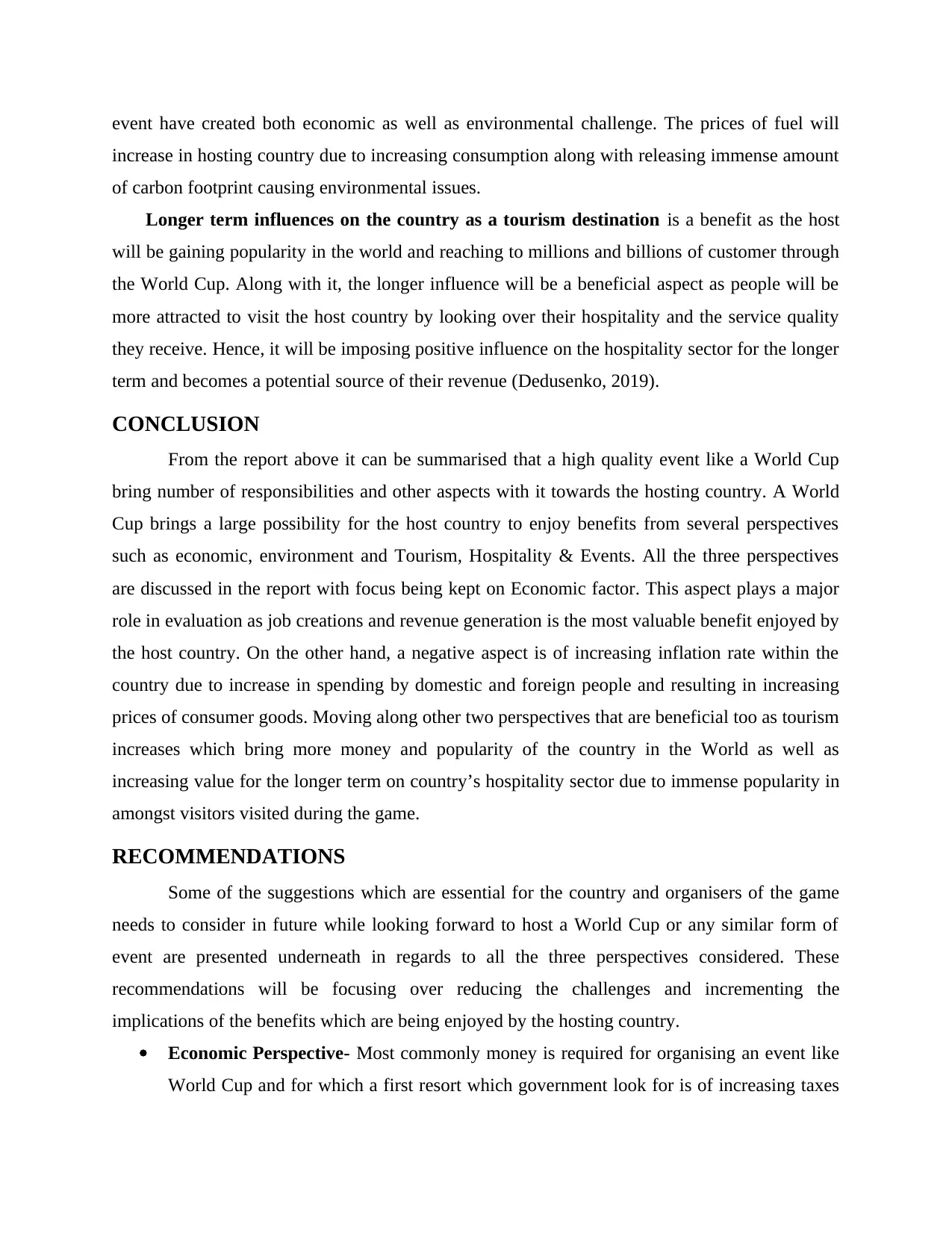
event have created both economic as well as environmental challenge. The prices of fuel will
increase in hosting country due to increasing consumption along with releasing immense amount
of carbon footprint causing environmental issues.
Longer term influences on the country as a tourism destination is a benefit as the host
will be gaining popularity in the world and reaching to millions and billions of customer through
the World Cup. Along with it, the longer influence will be a beneficial aspect as people will be
more attracted to visit the host country by looking over their hospitality and the service quality
they receive. Hence, it will be imposing positive influence on the hospitality sector for the longer
term and becomes a potential source of their revenue (Dedusenko, 2019).
CONCLUSION
From the report above it can be summarised that a high quality event like a World Cup
bring number of responsibilities and other aspects with it towards the hosting country. A World
Cup brings a large possibility for the host country to enjoy benefits from several perspectives
such as economic, environment and Tourism, Hospitality & Events. All the three perspectives
are discussed in the report with focus being kept on Economic factor. This aspect plays a major
role in evaluation as job creations and revenue generation is the most valuable benefit enjoyed by
the host country. On the other hand, a negative aspect is of increasing inflation rate within the
country due to increase in spending by domestic and foreign people and resulting in increasing
prices of consumer goods. Moving along other two perspectives that are beneficial too as tourism
increases which bring more money and popularity of the country in the World as well as
increasing value for the longer term on country’s hospitality sector due to immense popularity in
amongst visitors visited during the game.
RECOMMENDATIONS
Some of the suggestions which are essential for the country and organisers of the game
needs to consider in future while looking forward to host a World Cup or any similar form of
event are presented underneath in regards to all the three perspectives considered. These
recommendations will be focusing over reducing the challenges and incrementing the
implications of the benefits which are being enjoyed by the hosting country.
Economic Perspective- Most commonly money is required for organising an event like
World Cup and for which a first resort which government look for is of increasing taxes
increase in hosting country due to increasing consumption along with releasing immense amount
of carbon footprint causing environmental issues.
Longer term influences on the country as a tourism destination is a benefit as the host
will be gaining popularity in the world and reaching to millions and billions of customer through
the World Cup. Along with it, the longer influence will be a beneficial aspect as people will be
more attracted to visit the host country by looking over their hospitality and the service quality
they receive. Hence, it will be imposing positive influence on the hospitality sector for the longer
term and becomes a potential source of their revenue (Dedusenko, 2019).
CONCLUSION
From the report above it can be summarised that a high quality event like a World Cup
bring number of responsibilities and other aspects with it towards the hosting country. A World
Cup brings a large possibility for the host country to enjoy benefits from several perspectives
such as economic, environment and Tourism, Hospitality & Events. All the three perspectives
are discussed in the report with focus being kept on Economic factor. This aspect plays a major
role in evaluation as job creations and revenue generation is the most valuable benefit enjoyed by
the host country. On the other hand, a negative aspect is of increasing inflation rate within the
country due to increase in spending by domestic and foreign people and resulting in increasing
prices of consumer goods. Moving along other two perspectives that are beneficial too as tourism
increases which bring more money and popularity of the country in the World as well as
increasing value for the longer term on country’s hospitality sector due to immense popularity in
amongst visitors visited during the game.
RECOMMENDATIONS
Some of the suggestions which are essential for the country and organisers of the game
needs to consider in future while looking forward to host a World Cup or any similar form of
event are presented underneath in regards to all the three perspectives considered. These
recommendations will be focusing over reducing the challenges and incrementing the
implications of the benefits which are being enjoyed by the hosting country.
Economic Perspective- Most commonly money is required for organising an event like
World Cup and for which a first resort which government look for is of increasing taxes
Paraphrase This Document
Need a fresh take? Get an instant paraphrase of this document with our AI Paraphraser
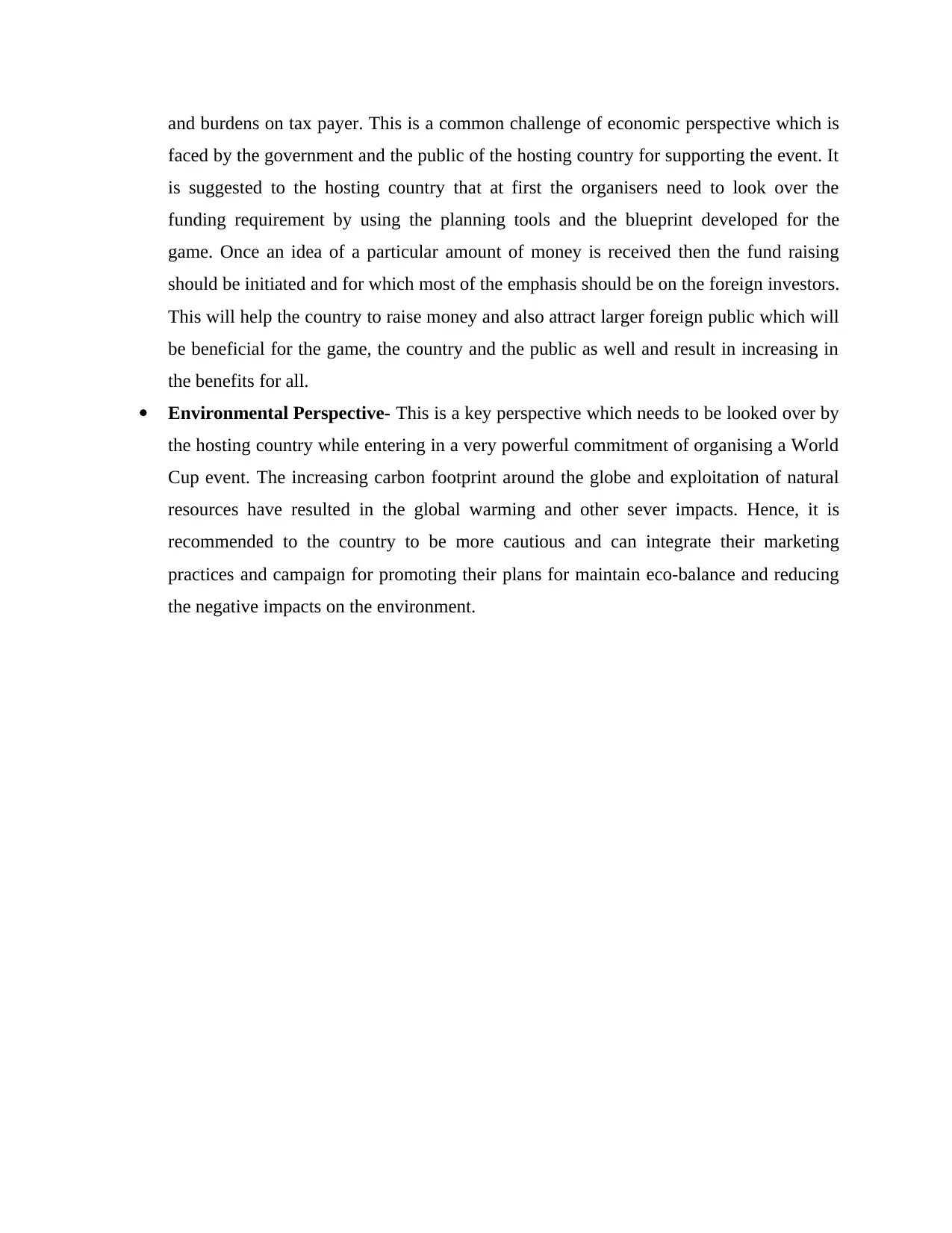
and burdens on tax payer. This is a common challenge of economic perspective which is
faced by the government and the public of the hosting country for supporting the event. It
is suggested to the hosting country that at first the organisers need to look over the
funding requirement by using the planning tools and the blueprint developed for the
game. Once an idea of a particular amount of money is received then the fund raising
should be initiated and for which most of the emphasis should be on the foreign investors.
This will help the country to raise money and also attract larger foreign public which will
be beneficial for the game, the country and the public as well and result in increasing in
the benefits for all.
Environmental Perspective- This is a key perspective which needs to be looked over by
the hosting country while entering in a very powerful commitment of organising a World
Cup event. The increasing carbon footprint around the globe and exploitation of natural
resources have resulted in the global warming and other sever impacts. Hence, it is
recommended to the country to be more cautious and can integrate their marketing
practices and campaign for promoting their plans for maintain eco-balance and reducing
the negative impacts on the environment.
faced by the government and the public of the hosting country for supporting the event. It
is suggested to the hosting country that at first the organisers need to look over the
funding requirement by using the planning tools and the blueprint developed for the
game. Once an idea of a particular amount of money is received then the fund raising
should be initiated and for which most of the emphasis should be on the foreign investors.
This will help the country to raise money and also attract larger foreign public which will
be beneficial for the game, the country and the public as well and result in increasing in
the benefits for all.
Environmental Perspective- This is a key perspective which needs to be looked over by
the hosting country while entering in a very powerful commitment of organising a World
Cup event. The increasing carbon footprint around the globe and exploitation of natural
resources have resulted in the global warming and other sever impacts. Hence, it is
recommended to the country to be more cautious and can integrate their marketing
practices and campaign for promoting their plans for maintain eco-balance and reducing
the negative impacts on the environment.
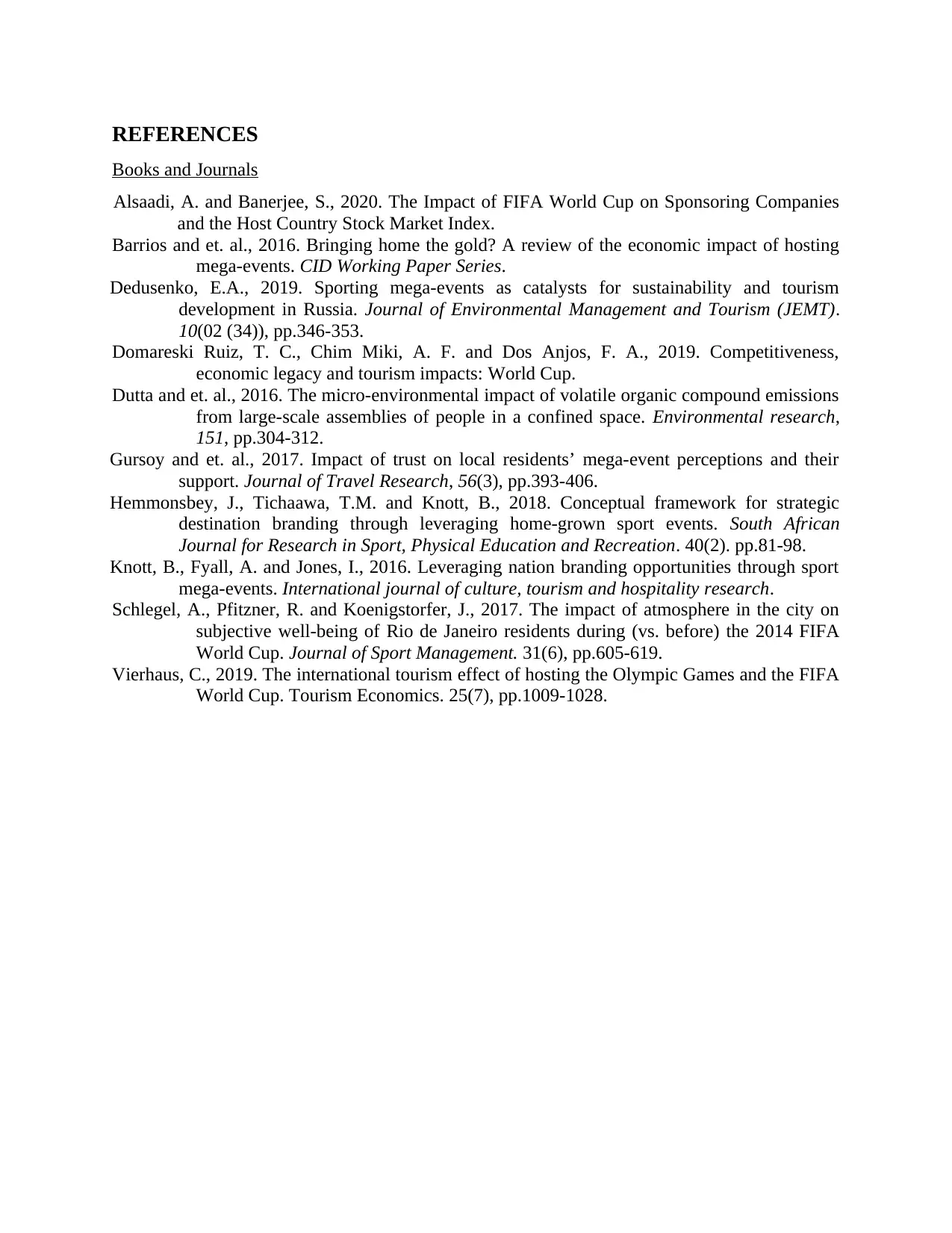
REFERENCES
Books and Journals
Alsaadi, A. and Banerjee, S., 2020. The Impact of FIFA World Cup on Sponsoring Companies
and the Host Country Stock Market Index.
Barrios and et. al., 2016. Bringing home the gold? A review of the economic impact of hosting
mega-events. CID Working Paper Series.
Dedusenko, E.A., 2019. Sporting mega-events as catalysts for sustainability and tourism
development in Russia. Journal of Environmental Management and Tourism (JEMT).
10(02 (34)), pp.346-353.
Domareski Ruiz, T. C., Chim Miki, A. F. and Dos Anjos, F. A., 2019. Competitiveness,
economic legacy and tourism impacts: World Cup.
Dutta and et. al., 2016. The micro-environmental impact of volatile organic compound emissions
from large-scale assemblies of people in a confined space. Environmental research,
151, pp.304-312.
Gursoy and et. al., 2017. Impact of trust on local residents’ mega-event perceptions and their
support. Journal of Travel Research, 56(3), pp.393-406.
Hemmonsbey, J., Tichaawa, T.M. and Knott, B., 2018. Conceptual framework for strategic
destination branding through leveraging home-grown sport events. South African
Journal for Research in Sport, Physical Education and Recreation. 40(2). pp.81-98.
Knott, B., Fyall, A. and Jones, I., 2016. Leveraging nation branding opportunities through sport
mega-events. International journal of culture, tourism and hospitality research.
Schlegel, A., Pfitzner, R. and Koenigstorfer, J., 2017. The impact of atmosphere in the city on
subjective well-being of Rio de Janeiro residents during (vs. before) the 2014 FIFA
World Cup. Journal of Sport Management. 31(6), pp.605-619.
Vierhaus, C., 2019. The international tourism effect of hosting the Olympic Games and the FIFA
World Cup. Tourism Economics. 25(7), pp.1009-1028.
Books and Journals
Alsaadi, A. and Banerjee, S., 2020. The Impact of FIFA World Cup on Sponsoring Companies
and the Host Country Stock Market Index.
Barrios and et. al., 2016. Bringing home the gold? A review of the economic impact of hosting
mega-events. CID Working Paper Series.
Dedusenko, E.A., 2019. Sporting mega-events as catalysts for sustainability and tourism
development in Russia. Journal of Environmental Management and Tourism (JEMT).
10(02 (34)), pp.346-353.
Domareski Ruiz, T. C., Chim Miki, A. F. and Dos Anjos, F. A., 2019. Competitiveness,
economic legacy and tourism impacts: World Cup.
Dutta and et. al., 2016. The micro-environmental impact of volatile organic compound emissions
from large-scale assemblies of people in a confined space. Environmental research,
151, pp.304-312.
Gursoy and et. al., 2017. Impact of trust on local residents’ mega-event perceptions and their
support. Journal of Travel Research, 56(3), pp.393-406.
Hemmonsbey, J., Tichaawa, T.M. and Knott, B., 2018. Conceptual framework for strategic
destination branding through leveraging home-grown sport events. South African
Journal for Research in Sport, Physical Education and Recreation. 40(2). pp.81-98.
Knott, B., Fyall, A. and Jones, I., 2016. Leveraging nation branding opportunities through sport
mega-events. International journal of culture, tourism and hospitality research.
Schlegel, A., Pfitzner, R. and Koenigstorfer, J., 2017. The impact of atmosphere in the city on
subjective well-being of Rio de Janeiro residents during (vs. before) the 2014 FIFA
World Cup. Journal of Sport Management. 31(6), pp.605-619.
Vierhaus, C., 2019. The international tourism effect of hosting the Olympic Games and the FIFA
World Cup. Tourism Economics. 25(7), pp.1009-1028.
⊘ This is a preview!⊘
Do you want full access?
Subscribe today to unlock all pages.

Trusted by 1+ million students worldwide
1 out of 9
Related Documents
Your All-in-One AI-Powered Toolkit for Academic Success.
+13062052269
info@desklib.com
Available 24*7 on WhatsApp / Email
![[object Object]](/_next/static/media/star-bottom.7253800d.svg)
Unlock your academic potential
Copyright © 2020–2026 A2Z Services. All Rights Reserved. Developed and managed by ZUCOL.





